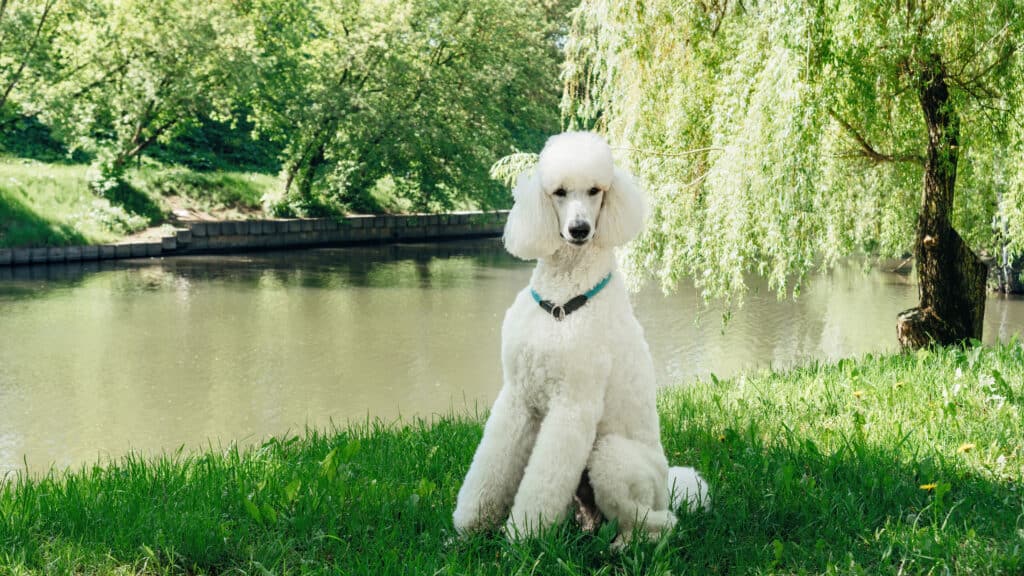Welcome to our comprehensive article on the intelligence of poodles! In this fascinating piece, we delve into everything known about these remarkable dogs’ cognitive abilities. From their problem-solving skills to their quick learning capacity, join us as we explore just how smart poodles truly are.
Exploring the Intelligence of Poodles

The poodle breed of dogs are intelligent animals who are capable of thinking independently.
©nieriss/Shutterstock.com
Poodles are an iconic breed of dog known for their intelligence and trainability. They are highly sought after as family pets for their loyalty, intelligence, and playful nature. But just how intelligent are poodles?
Poodles are among the smartest breeds of dogs. They excel in tasks that require problem-solving and are able to learn tricks quickly and easily. They easily learn the commands of their owners and obey them reliably.
In addition to their intelligence, poodles have a reputation for being able to adapt to various situations. You can teach them to respond to numerous commands, such as sitting, fetching, and rolling over. This breed can also learn quickly and remember what they have been taught.
Poodles have the remarkable ability to think independently. They can make decisions on their own and can often figure out how to solve a problem by themselves. This trait can come in handy if they are left alone for extended periods of time.
Overall, poodles are an intelligent breed that can be a great addition to any family. They are loyal, trainable, and can think independently, making them a great companion. With the right training and care, poodles can make an excellent pet for any home.
The Cognitive Capabilities of Poodles: Understanding Their Problem-Solving Skills and Brain Size

Don’t be surprised if your poodle quickly learns the words you are saying.
©iStock.com/HaiGala
Poodles are incredibly intelligent dogs, and people have bred them for centuries to be problem-solvers. Most people know that these dogs have great problem-solving skills and strong cognitive capabilities. Understanding their brain size and problem-solving skills can help us better appreciate the intelligence of these dogs.
Poodles have large brains compared to their body size, which is one of the traits that make them so smart. Their brain size allows them to process information quickly and accurately, enabling them to solve problems with ease. On top of this, their brains also have a high level of plasticity, which means that they can learn new things quickly and with less effort.
Poodles also have the ability to use their problem-solving skills to find creative solutions to problems. They can use their intelligence to think outside the box and come up with solutions that other dogs may not be able to think of. For example, they may be able to figure out how to open a door or how to find a hidden toy.
Poodles also have strong communication skills, which is another trait that makes them so smart. They are able to understand and respond to commands from their owners, making them great companions. Poodles also have a strong drive to please their owners, which helps them learn quickly and stay focused.
In addition to their problem-solving skills, poodles also have a strong memory. They can remember commands and tasks for long periods of time, which makes them great at performing tricks and tasks. They also remember the locations of things, which can help them find their way around the house and back home.
Poodle Learning Aptitude: How Quick and Adaptive Are They?

If you want a dog that is intelligent and fun to train, a poodle may be for you!
©iStock.com/Nynke Van Holten
Poodles have long been known for their intelligence, and they are often lauded as the smartest of all dog breeds. But what about their learning aptitude? Are they quick learners, and how adaptive are they?
The answer to these questions is a resounding yes. Poodles are very quick learners, and their learning aptitude is far superior to that of most other breeds. They have a natural inquisitiveness and are able to pick up on new concepts and ideas very quickly. They are also highly adaptable and can quickly adjust to new situations and environments.
Their intelligence and learning aptitude make them ideal candidates for obedience classes and other training sessions. They have the capacity to learn commands quickly and remember them for extended periods of time. This makes them excellent pets for those who desire a well-behaved canine companion.
In addition to their intelligence and learning aptitude, poodles have other desirable traits. They are devoted and loyal to their owners, and they are also loving, gentle, and affectionate.
Intelligence Ranking: Where Does a Poodle Stand Among Other Breeds?

Compared to several other dog breeds, poodles are equally smart and talented.
©everydoghasastory/Shutterstock.com
Poodle intelligence makes them a highly sought-after breed. People love having dogs that are alert, responsive, and eager to please. But how does a poodle compare to other breeds in terms of intelligence?
When it comes to intelligence, it is difficult to compare different breeds as each breed’s intelligence is based on its purpose and environment. However, poodles are among the most intelligent breeds. In comparison to other breeds, poodles can learn commands and tricks quickly.
For instance, Labrador retrievers are incredibly trainable and intelligent, with the ability to learn almost any command or trick. This breed is also loyal and an incredibly enthusiastic learner. However, poodles have the ability to think more independently and can learn a variety of commands and tricks. They can remember things longer than other breeds and have a longer attention span.
Border collies are also a very intelligent breed. They are incredibly smart and have the ability to learn many different commands. They are also great problem-solvers and incredibly fast learners. However, poodles have the benefit of being eager to please and willing to learn.
Finally, German shepherds are certainly very intelligent and have the ability to learn a variety of commands. They are also strong and confident dogs. However, poodles have the advantage of being more obedient and loyal.
Unlocking Poodle’s Intelligence Potential: Training Techniques and Mental Stimulation

Training is fun when you have a dog that is eager to please.
©Romvy/Shutterstock.com
Poodles are renowned for their intelligence and trainability. With the right guidance and effort, they can accomplish amazing feats that make them an ideal companion. To unlock their potential, they must be given the right training techniques, mental stimulation, and positive reinforcement.
Training techniques should include basic commands such as sit, stay, come, and heel. It is also important to teach your poodle tricks and problem-solving skills, such as fetching a toy or opening a door. Positive reinforcement is essential for these activities, as it will motivate your pup to continue learning.
Mental stimulation is just as important as physical exercise for a poodle. This can include activities such as hide-and-seek, finding a hidden treat, or solving a puzzle. Such activities can help keep your pup engaged and help develop their problem-solving skills.
It is also important to provide plenty of socialization opportunities for your pup. Poodles do well in a variety of social settings, so introducing them to different people and animals can help them become more confident and well-adjusted.
Finally, it is important to provide plenty of physical exercise for your poodle. They need regular walks and playtime to stay healthy and happy. This will also help them work off their energy, reducing the chances of destructive behavior.
10 Poodle Training Tips
- Give your dog plenty of praise and treats for good behavior.
- Keep training sessions short and sweet.
- Be consistent with commands and signals.
- Start with simple commands and gradually increase the difficulty.
- Use positive reinforcement to reward desired behaviors. The reward can be treats, pets, belly rubs, or playing fetch.
- Don’t use physical punishment or harsh language.
- Break down complex tasks into smaller steps.
- Be patient, and remember that it takes time for a dog to learn.
- Use a variety of treats and rewards to keep training interesting.
- Make sure to end each training session on a positive note. After all, building a strong and lasting bond with your poodle is the most important part!
The photo featured at the top of this post is © iStock.com/tsik
Ready to discover the top 10 cutest dog breeds in the entire world?
How about the fastest dogs, the largest dogs and those that are -- quite frankly -- just the kindest dogs on the planet? Each day, AZ Animals sends out lists just like this to our thousands of email subscribers. And the best part? It's FREE. Join today by entering your email below.
Thank you for reading! Have some feedback for us? Contact the AZ Animals editorial team.






